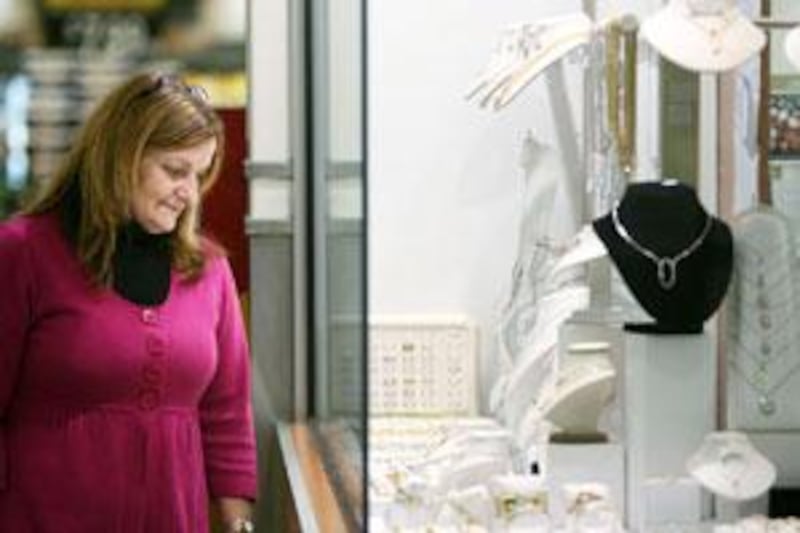SYDNEY // Holidays, haircuts and household goods are in demand as new figures in Australia show that government stimulus payments are propping up the country's retail sector as the economy slips closer to recession. Millions of workers and families have been receiving cheques worth up to A$950 (Dh2,860) as part of efforts to help Australia spend its way out of trouble. The cash bonuses are part of a $42 billion spending package that began at the end of last year, which was aimed at parents and pensioners, while a second round of handouts is now targeting those on middle to low incomes. The Australian prime minister, Kevin Rudd, has urged recipients to do the right thing and spend the money for the good of the country as the economy continues to falter. Grace Chan, a student, has done just that. "I'm just having a simple wash, cut and style, which is costing $30 and it's courtesy of the government. Thanks, Kevin Rudd!" she said cheerfully as she sat in a brightly lit hairdressing salon in the Strathfield district of Sydney. "I am a bit of an economist so I'm a firm believer in the multiplier effect. It works. You give me money and I spend it and everybody benefits," said Ms Chan, 21, who is studying commercial cookery. The Australian Bureau of Statistics has said retail sales grew by 0.3 per cent in April, a good result given the rapid contraction in other sectors. These gains have built on buoyant retail figures reported in the previous month, a sign that the government's pump-priming policy is having a positive effect, at least in the short-term. However, there are concerns that, as Australia's fiancial woes worsen and unemployment rises, worried shoppers will cut discretionary expenditure and will soon opt to save rather than spend. Many small businesses are feeling the pain. Dianna Song, owner of the FM Beauty and Hair Salon in Strathfield, said the government's stimulus packages had boosted trade but that once that money had dried up, consumers would do without luxuries and treats. "People have already spent much of it and soon they will have no more to spend. It is very quiet, the worst it has ever been - seriously. If it gets worse I think I will have to reduce my staff," she said. Amid the gloom, though, there is also hope that the recovery will not be too far away. Connie Mercia, 49, an unemployed secretary who has been job-hunting for the past seven months, firmly believes that the good times will eventually return. "I am very optimistic that things will change by the middle of next year," said Ms Mercia, who has received a handout of $900. "I haven't spent it yet, but maybe it will go on a holiday up to the sun in Queensland to take time out. My second choice would be watches and bracelets," she added. The Rudd government's massive spending programme will put the country deeply into the red for several years and while ministers have insisted that drastic measures were necessary in such extraordinary times, many Australians are anxious about what happens further down the track. "Anybody that has got a head on their shoulders would be worried about the debt, not for themselves but for future generations," said John Matthews, 79. A pile of debt was also a concern for fellow shopper, Louise Millward, 34, a new mother who has used a bonus payment of $250 to buy a pram. "It's a controversial idea," she said. "There are a lot of people who aren't quite sure whether the money should be given out in this way. It has been very helpful for us, but I'm not sure if it is really helping the economy that much. "Our children are going to carry the debt, unfortunately. It's not great." Economists have estimated about 20 per cent of the stimulus handouts will be spent on non-essential items, with the remainder being saved, used to pay off a credit card or to chip away at a mortgage. Academics believe that large amounts have also been frittered away on gambling. "There is no doubt that many people who got the stimulus money put all or a hefty proportion of it through the poker [or slot] machines," said Charles Livingstone, a senior lecturer at Monash University in Melbourne. "So, someone with a gambling problem could easily put that money through the pokies without really noticing it." With the Australian economy in such a perilous state, churches have helped their congregations to accept the new reality of rising joblessness and mounting debt. "In times of prosperity, it is easier to trust a set of materialistic values," said Greg Burke, a senior minister at St Anne's Anglican Church in the Sydney suburb of Ryde. "When the prosperity dries up, people are more open to the question: 'Were those values really worth staking our life on?' There is much more to a person than their bank balance or their pension plans," he said. pmercer@thenational.ae
Australia goes on a spending spree
The government hopes that by giving stimulus payments to millions of consumers it will help to buoy the country's ailing economy.

More from the national




